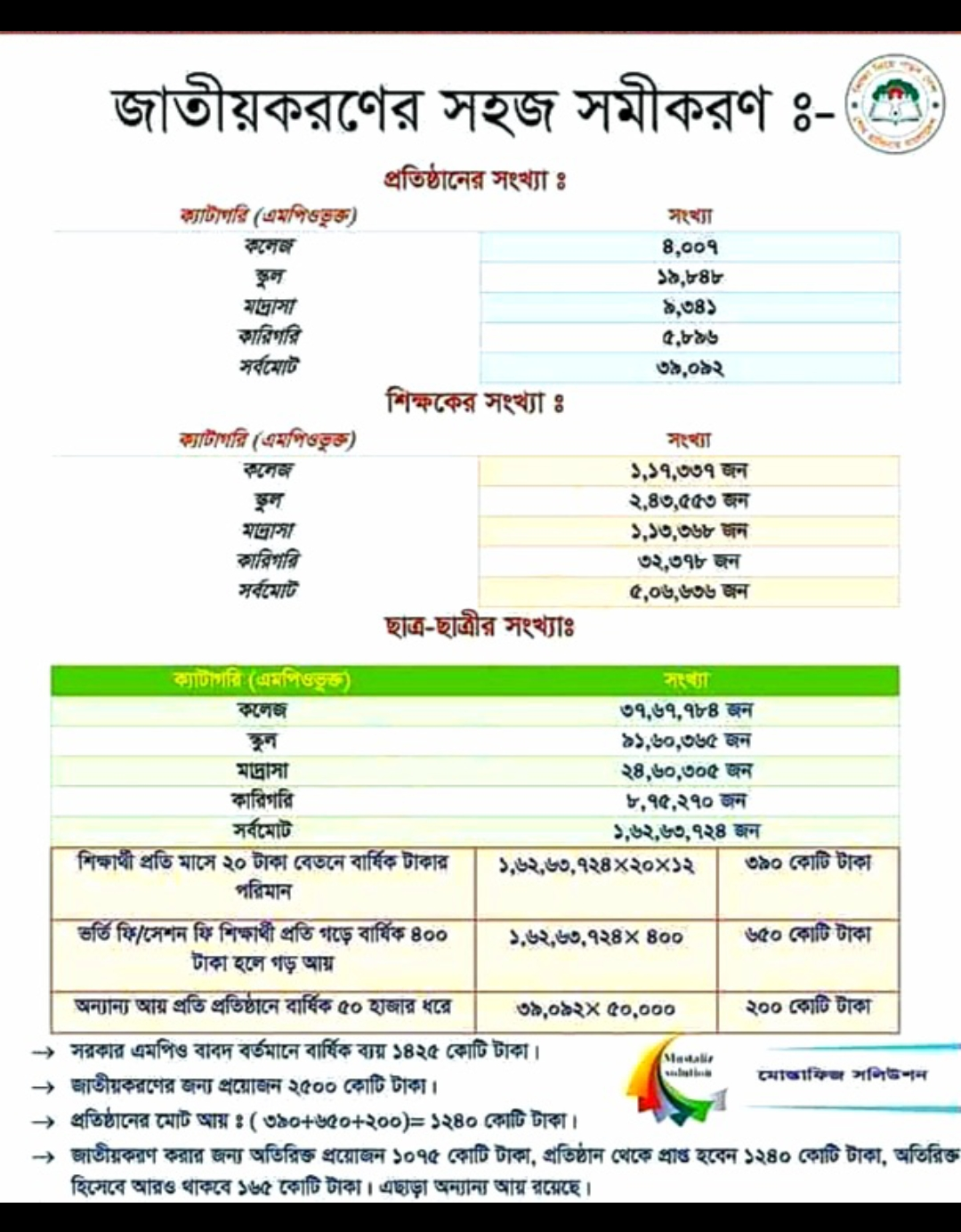| Masoom Hasan
The idea of nationalizing Bangladesh`s education system has gained traction as the country strives to improve educational standards and provide equal opportunities for all students. Nationalization could help create a unified, high-quality education system that reduces disparities and ensures that every child, regardless of their background, has access to the same standard of education. However, this ambitious goal requires careful planning, significant resources, and broad support across society.
Creating a Clear Policy and Legal Framework
The first step towards nationalizing education in Bangladesh is establishing a comprehensive national education policy. This policy should clearly define the goals and principles of the nationalized education system, emphasizing equal access, quality education, and inclusivity for all students.
In addition to policy development, legal reforms will be necessary. This could involve amending existing laws or introducing new ones to support a unified curriculum, centralize educational administration, and regulate private and religious schools. A key part of this process will be enforcing a compulsory education law to ensure that all children attend school up to a certain age.
### **Developing a Unified Curriculum**
A standardized national curriculum is central to the nationalization process. This curriculum should be inclusive, culturally relevant, and adaptable to the diverse needs of Bangladesh`s various regions and communities. It should also promote critical thinking, creativity, and a strong sense of national identity alongside academic excellence.
To support this, standardized textbooks must be developed and distributed across all schools, ensuring that all students have access to the same learning materials. A clear language policy should be established, prioritizing Bangla as the medium of instruction, while also incorporating English and regional languages to better prepare students for global opportunities.
### **Streamlining Administration and Management**
Nationalizing the education system requires strong centralized administration. A National Education Board could be set up or strengthened to oversee curriculum implementation, teacher recruitment, and school accreditation. This board would ensure that educational standards are maintained across the country.
While centralization is important for consistency, it is also crucial to allow for some degree of local flexibility. Regional offices can help manage and monitor schools at the local level, ensuring that they can address specific challenges and meet the unique needs of their communities.
### **Investing in Teachers**
Teachers are the foundation of any education system. Therefore, it is essential to standardize teacher recruitment and ensure that all educators meet national qualifications. Ongoing professional development programs should be implemented to keep teachers updated on new teaching methods, technology integration, and inclusive education practices.
To attract and retain qualified teachers, particularly in rural and underserved areas, the government should offer incentives such as competitive salaries, housing, and other benefits.
### **Improving School Infrastructure and Resources**
For nationalization to be successful, significant investment in school infrastructure is necessary. This includes building and upgrading classrooms, libraries, laboratories, and sanitation facilities, especially in rural and remote areas.
Incorporating technology into the education system is also essential. Providing digital learning tools, internet access, and computer labs will ensure that students across the country can benefit from modern educational resources.
It is equally important to ensure that resources are distributed fairly. Schools in underprivileged areas should be prioritized to reduce disparities and ensure that all students have access to the same opportunities.
### **Ensuring Quality and Inclusivity**
To maintain high educational standards, regular national assessments should be conducted to monitor student performance across the country. School inspections and feedback mechanisms are essential for addressing issues and continuously improving the education system.
Inclusivity must be a core principle of the nationalized system. Specialized programs and resources should be developed for students with special needs to ensure they have equal access to education. Gender equality should also be promoted by addressing barriers that prevent girls from attending school and ensuring that the curriculum is gender-sensitive.
### **Engaging Private and Religious Schools**
A significant challenge in nationalizing the education system is integrating private and religious schools. Madrasa education should be aligned with the national curriculum to provide students with a balanced education that includes both religious and secular subjects.
Private schools should be regulated to ensure they meet national standards while allowing them some autonomy. Collaboration with these institutions is vital to creating a unified education system that serves the needs of all students.
### **Raising Public Awareness and Involving Communities**
Public awareness and community involvement are crucial for the success of nationalization. Awareness campaigns should be conducted to educate the public about the benefits of a nationalized education system. Local communities, parents, and other stakeholders should be actively involved in the implementation process to build trust and ensure that the system meets the needs of all.
### **Financial Planning and Sustainability**
Nationalizing the education system will require significant financial investment. The government must prioritize education in the national budget and allocate sufficient funds to support this process. Additionally, seeking international aid and partnerships can help supplement domestic resources.
Ensuring the sustainability of the nationalized system will also require efficient resource management and the implementation of cost-effective measures.
### **Overcoming Challenges and Moving Forward**
While nationalizing Bangladesh’s education system presents challenges, including potential resistance from private institutions and the need for significant resources, it is an achievable goal. Success will depend on strong political will, stable governance, and the active involvement of all stakeholders.
By taking a phased approach—starting with policy reforms, followed by curriculum development, teacher training, infrastructure improvement, and continuous quality monitoring—Bangladesh can build an education system that is equitable, inclusive, and capable of preparing its students for the future.
Nationalizing the education system is about more than just standardizing learning. It is about building a stronger, more unified nation where every child has the opportunity to succeed.
Author: News Editor, Notunbazar71.com
*This opinions are generated from Artificial Intelligence Platforms (ChatGPT, Gemini)
| 



